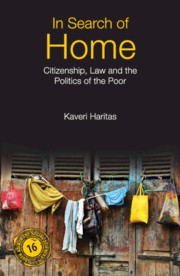2 - In Limbo
Published online by Cambridge University Press: 24 July 2021
Summary
limbo /ˈlɪmbəʊ/
2. An uncertain period of awaiting a decision or resolution; an intermediate state or condition.
2.1 A state of neglect or oblivion.
(Oxford Living Dictionaries)They have shifted us from huts to a concrete slum. Until we get land rights we are not independent. We lived in houses built with leaves earlier and now we have cement walls. (Shankar, interview, Laggere Bangalore, 18 January 2013).
On a late December afternoon in 2009, as my taxi wound down the narrow streets off the Peenya road in the west of Bangalore, I stopped to ask for directions on my way to the Laggere rehabilitation area. Not knowing how to translate ‘rehabilitation area’ in Kannada, I asked a man exiting from a middle-class home nearby for directions to the housing provided by the Karnataka Slum Board. Muttering ‘slum board quarters’ he pointed me down the road. Over the following six years I heard the residents of the rehabilitation area refer to their homes interchangeably as ‘slum board quarters’, ‘slum quarters’ or simply ‘quarters’. ‘Quarters’ as a term is commonly used to refer to housing provided to public officials and employees. The police, for instance, live in quarters that are assigned to them, as do other public officials and bureaucrats as well as employees of public sector establishments. Quarters are thus secure residential areas often cordoned off from neighbourhoods outside and housing respectable people. As I entered Laggere for the first time, I was struck by the appearance of the rehabilitation homes, which seemed much like quarters housing provided to lower-rung government officials (see Figure 2.1). I had a meeting with Mahmoud, a resident of Laggere, whom I had been introduced to by a friend at a reputed NGO, Association for Promoting Social Action (APSA), known for its work with the urban poor. APSA was supporting slum leaders contesting in the upcoming municipal elections in 2010. Mahmoud had announced his candidature in Laggere, with the hope of representing the ‘slum quarters’ and addressing the problems people faced there.
Mahmoud's parents had worked as construction workers building the state legislative house in Bangalore (Vidhana Soudha) and their settlement was moved to Laggere in the early 1980s.
- Type
- Chapter
- Information
- In Search of HomeCitizenship, Law and the Politics of the Poor, pp. 30 - 66Publisher: Cambridge University PressPrint publication year: 2021

